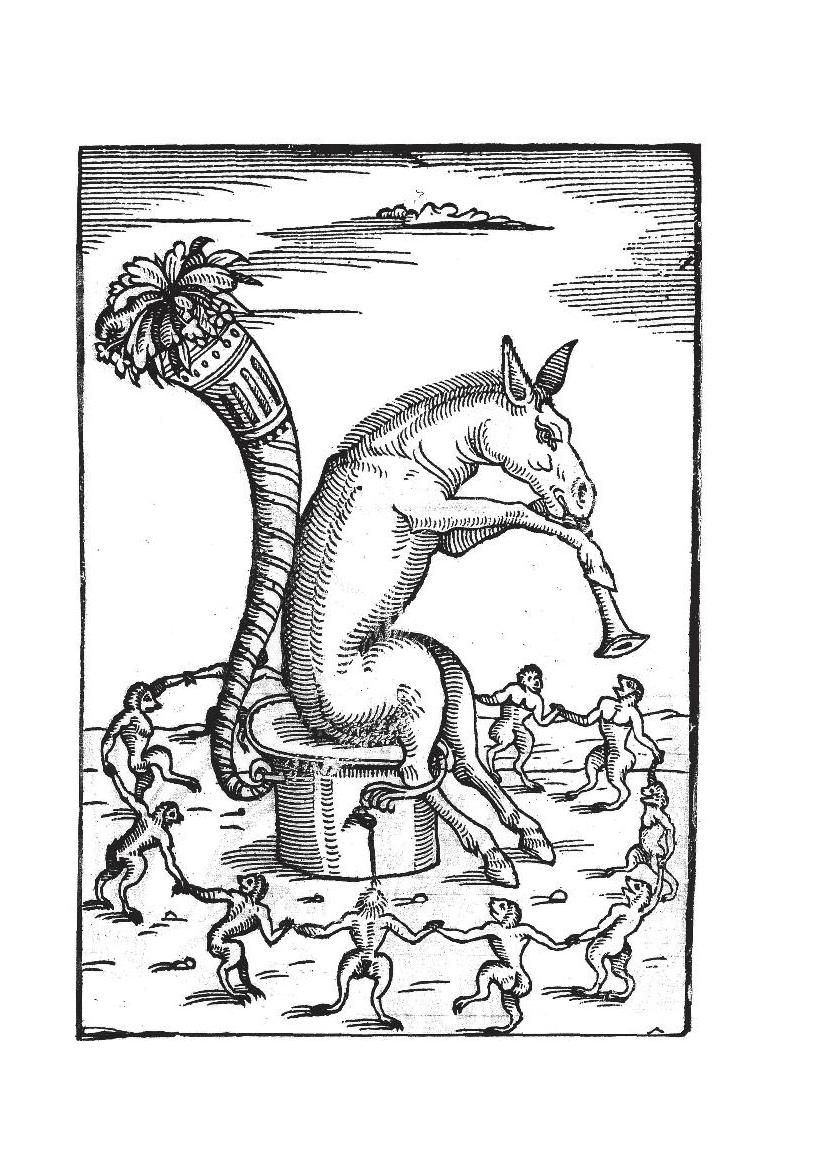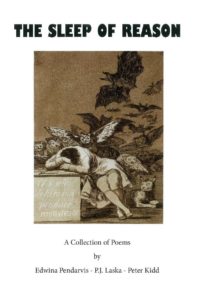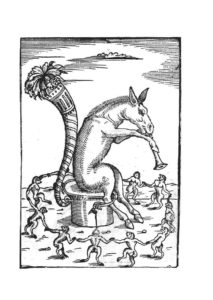
The Sleep of Reason: A Collection of Poems by Edwina Pendarvis, P. J. Laska, and Peter Kidd, Igneus Press, 2019, $5
Review by Roger D. Hicks
This little book of poetry has been in the making for a short while and, since I know two of the authors, I had been eagerly anticipating its arrival in my mail box for a while. It appeared yesterday and I quickly slammed through it which I don’t usually do with poetry. I like to read poetry slowly, a poem or two at a time, and then return at least once or twice to reread it for better comprehension, appreciation, and respect for the poets involved. I assure you I will do that with this little epistle at least once or twice more. But, also out of respect for the authors, this work deserves your attention and awareness of its existence as soon as possible. “The Sleep Of Reason” by Edwina Pendarvis, P. J. Laska, & Peter Kidd is available from Igneus Press, a small press which was founded by one of the authors, Peter Kidd, whom I do not know. But P. J. Laska and I have been friends since the early 1970’s when we first met and he was a finalist for a National Book Award in Poetry for his collection, “D. C. Images And Other Poems”. Laska introduced me to Edwina Pendarvis and she and I have been friends about two years although we grew up in different forks of Beaver Creek at slightly different times only a few miles apart.

The book is entitled for an etching by Francisco Goya, the great Spanish artist which is more fully entitled “The Sleep Of Reason Produces Monsters” and is in the permanent collection of the Prado. The etching is a metaphor for the many prices of ignorance, especially self-imposed ignorance. It one of a series of about eighty prints which Goya produced about the “caprices” of Spanish society in his time from about 1746 to 1828. According to Art Gallery NSW, Goya was making statements about many of the weaknesses of unthinking, uneducated, and willfully ignorant people. Art Gallery NSW’s analysis of the piece states that Goya’s intent was to confront “…superstition, vanity and folly, as well as hypocrisy, cruelty, greed and injustice.” I cannot think of a better analogy for discussing the lives and works of both Laska and Pendarvis. I do not know Peter Kidd or his work well enough, at this time, to make the same statement about his life and work. Both Laska and Pendarvis are doctoral level retired professors, native Appalachians, and have spent their lives in the effort to confront and eliminate all those same weaknesses which Francisco Goya was addressing in his etching. When I think of the two of them, I am also reminded of a quote from Clarence Darrow which I have used on my e-mail since shortly after November 8, 2016: “I have lived my life and I have fought my battles, not against the weak and poor—but against power, injustice, and oppression.” When Laska and I met for the first time, we were both connected to Antioch Appalachia, a branch campus of Antioch University which was located in Beckley, WV, which has come to be recognized over the last forty years as having produced some of the finest, and most politically and socially active, writers in America and Appalachia. When Pendarvis and I physically met for the first time, we were on our way to a political protest in Huntington, WV. This little book by Laska, Kidd, and Pendarvis continues that tradition of activism for all three of the authors. Goya would have been proud to be associated with such work.

The book is small, only about 28 pages, but it is well worth the price of admission. It contains eight poems by Pendarvis, seven by Laska, and eight by Kidd. All are examples of outspoken beliefs about some or all of the character flaws which Francisco Goya was confronting in the work for which the book is named. Pendarvis addresses the hanging of John Brown in 1859 in the poem “Farmer Brown Ascends The Gallows” and ends the poem with these powerful words:
“He’d kept his eyes on heaven
and the hell of this world and the next.
He loved the beauty of action.
The crops he raised blossomed fire.” (Edwina Pendarvis)
Those words epitomize several of the goals of a social activist, to always keep your eyes on the prize, to always know that we must confront injustice and ignorance wherever we find it, to take actions to bring about change, and to hope in our hearts every day that our actions will “blossom fire”.
In his poem “Almost Dead Matter Walking Bags”, Peter Kidd delivers some of his own political statements with the opening and closing words:
“a nation of self interested material/machine worshipers
forever waiting…
the Atom Bomb finger tips away
from the most sociopathic
narcissists in the world.” (Peter Kidd)
That, my friends is a strong political statement in today’s America. It is also a strong poetic statement in just about any other time or place. If reading lines like those does not raise your political hackles, then you have none.
But this little book is also loaded with what is simply just good, solid poetry intended to expand both the mind and soul of the astute reader. In her poem “Making Salt”, Pendarvis uses Daniel Boone to make both poetic and powerful points.
“Boone, skulking his lonely way
through iron age Kentucke
found mastodon bones lying around a salt lick…
Squatting by his fire, beside
a behemoth, he poured cold
salty water into a flat pot.” (Edwina Pendarvis)
While some readers might wish to quibble about the use of the words “by” and “beside” in the same line, very few would argue with the deft phrasing and opulent word pictures the poem conveys.
Over the last forty plus years, I have been blessed to read most of the literature which P. J. Laska has produced, much of it in the manuscript stage, and I must insist that this little book contains some of his best work over the last decade or more. You will find this book to be pleasure and a motivator for some social action on your own part. You can buy the book from Igneus Press or from Ecces Books, 392 Rio Altar, Green Valley, AZ 85614.
reblogged from http://myappalachianlife.blogspot.com/2019/04/the-sleep-of-reason-by-edwina-pendarvis.html (Apr. 8, 2019)
[contact-field label="Name" type="name" required="true"/][contact-field label="Email" type="email" required="true"/][contact-field label="Website" type="url"/][contact-field label="Message" type="textarea"/][/
